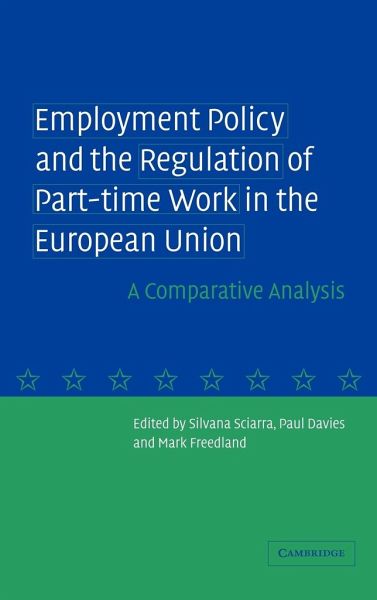
Employment Policy and the Regulation of Part-Time Work in the European Union
A Comparative Analysis
Herausgeber: Sciarra, Silvana; Davies, Paul; Freedland, Mark

PAYBACK Punkte
63 °P sammeln!
Short description/annotationThis book examines the influence of EC rules on European nations' policies towards part-time working.Main descriptionThis book originates from the research project 'New discourses in labour law' held at the European University Institute. A detailed analysis of part-time work regulation is presented for seven European countries, in order to ascertain how internal domestic choices of the legislatures have merged into the 'Open method of co-ordination'. The impact of European employment policies is considered in parallel with the implementation of the Directive on part...
Short description/annotation
This book examines the influence of EC rules on European nations' policies towards part-time working.
Main description
This book originates from the research project 'New discourses in labour law' held at the European University Institute. A detailed analysis of part-time work regulation is presented for seven European countries, in order to ascertain how internal domestic choices of the legislatures have merged into the 'Open method of co-ordination'. The impact of European employment policies is considered in parallel with the implementation of the Directive on part-time work, thus providing a complete overview of both soft and hard law mechanisms available to national policy-makers. In this original work, the inter-action between law and policy emerges as a dynamic and constantly changing process of exchange between national and supranational actors, through the use of concrete examples of law-making. Labour law is put forward as being central in the current evolution of European law, and this centrality is presented as a confirmation of innovation and continuity in regulatory techniques.
Table of contents:
List of figures and tables; Preface; List of abbreviations; Notes on contributors; Part I: 1. New discourses in labour law: part-time work and the paradigm of flexibility Silvana Sciarra; 2. The European employment strategy and the regulation of part-time work Diamond Ashiagbor; 3. The role of EU employment law and policy in the de-marginalisation of part-time work: a study in the interaction between EU regulation and member state regulation Paul Davies and Mark Freedland; Part II: 4. France: no longer an employment policy tool Sylvaine Laulom; 5. Germany: a bone of contention Maximilian Fuchs; 6. Italy: adaptable employment and private autonomy in the Italian part-time reform Antonio Lo Faro; 7. The Netherlands: from atypicality to typicality Jelle Visser, Ton Wilthagen, Ronald Beltzer and Esther Van Der Putte; 8. Spain: the difficulty of marrying flexibility with security Fernando Valdés Dal-Ré; 9. Sweden: welfare or unfair(?)33; Ronnie Eklund; 10. The United Kingdom: how is EU governance transformative(?)33; Claire Kilpatrick and Mark Freedland.
This book examines the influence of EC rules on European nations' policies towards part-time working.
Main description
This book originates from the research project 'New discourses in labour law' held at the European University Institute. A detailed analysis of part-time work regulation is presented for seven European countries, in order to ascertain how internal domestic choices of the legislatures have merged into the 'Open method of co-ordination'. The impact of European employment policies is considered in parallel with the implementation of the Directive on part-time work, thus providing a complete overview of both soft and hard law mechanisms available to national policy-makers. In this original work, the inter-action between law and policy emerges as a dynamic and constantly changing process of exchange between national and supranational actors, through the use of concrete examples of law-making. Labour law is put forward as being central in the current evolution of European law, and this centrality is presented as a confirmation of innovation and continuity in regulatory techniques.
Table of contents:
List of figures and tables; Preface; List of abbreviations; Notes on contributors; Part I: 1. New discourses in labour law: part-time work and the paradigm of flexibility Silvana Sciarra; 2. The European employment strategy and the regulation of part-time work Diamond Ashiagbor; 3. The role of EU employment law and policy in the de-marginalisation of part-time work: a study in the interaction between EU regulation and member state regulation Paul Davies and Mark Freedland; Part II: 4. France: no longer an employment policy tool Sylvaine Laulom; 5. Germany: a bone of contention Maximilian Fuchs; 6. Italy: adaptable employment and private autonomy in the Italian part-time reform Antonio Lo Faro; 7. The Netherlands: from atypicality to typicality Jelle Visser, Ton Wilthagen, Ronald Beltzer and Esther Van Der Putte; 8. Spain: the difficulty of marrying flexibility with security Fernando Valdés Dal-Ré; 9. Sweden: welfare or unfair(?)33; Ronnie Eklund; 10. The United Kingdom: how is EU governance transformative(?)33; Claire Kilpatrick and Mark Freedland.














